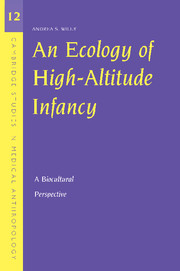Book contents
- Frontmatter
- Contents
- List of Figures, Photographs, and Tables
- Acknowledgments
- Abbreviations
- Glossary of Ladakhi Words
- An Ecology of High-Altitude Infancy
- 1 Introduction
- 2 Challenges of High-Altitude Living
- 3 Contextualizing Reproductive Health Research in Ladakh
- 4 Big Mountains, Small Babies
- 5 An Ecology of Infancy in Ladakh
- 6 Comparative Perspectives on Reproductive Health in Ladakh
- 7 Toward Relevant Research: Adaptation and Policy Perspectives on Maternal-Infant Health in Ladakh
- Notes
- References
- Index
- Titles in the series
7 - Toward Relevant Research: Adaptation and Policy Perspectives on Maternal-Infant Health in Ladakh
Published online by Cambridge University Press: 18 December 2009
- Frontmatter
- Contents
- List of Figures, Photographs, and Tables
- Acknowledgments
- Abbreviations
- Glossary of Ladakhi Words
- An Ecology of High-Altitude Infancy
- 1 Introduction
- 2 Challenges of High-Altitude Living
- 3 Contextualizing Reproductive Health Research in Ladakh
- 4 Big Mountains, Small Babies
- 5 An Ecology of Infancy in Ladakh
- 6 Comparative Perspectives on Reproductive Health in Ladakh
- 7 Toward Relevant Research: Adaptation and Policy Perspectives on Maternal-Infant Health in Ladakh
- Notes
- References
- Index
- Titles in the series
Summary
There are two broad issues that this work must now address. The first is theoretical and concerns the concept of adaptation. What do the findings from this investigation of maternal-infant health tell us about the adaptive status of Ladakhis vis-à-vis their socio- and natural ecology, and about evolutionary processes acting in this population? The second is more applied. How do these results inform health policy or help in the design of effective health interventions targeted at reducing the significant burden of early mortality in Ladakh? Furthermore, do the answers to these two questions have anything to do with one another? Evolutionary perspectives have rarely been linked to policy, and in some cases they have been interpreted as antagonistic, especially to social justice–based health policies (Singer 1989). Since the term evolutionary implies long-term biological processes, it does at first glance seem incompatible with policy making, which is concerned with issues of more immediate importance. But what an evolutionary perspective, especially one concerned with both biology and culture, tells us is that there are rarely effective “quick fixes” to endemic health problems that are tied to a complex of local behavior, ecology, and resources. In addition, it forces us to consider the long- and short-term costs and benefits of any sort of intervention in relation to the whole of a population's adaptations. After such considerations, even with no particular theoretical agenda, some possible domains of intervention can be suggested to address the very high rate of neonatal mortality revealed in this study.
- Type
- Chapter
- Information
- An Ecology of High-Altitude InfancyA Biocultural Perspective, pp. 178 - 204Publisher: Cambridge University PressPrint publication year: 2004



